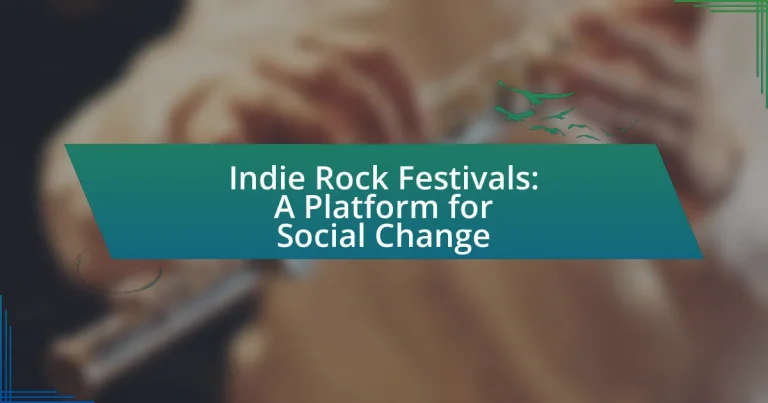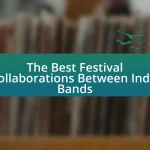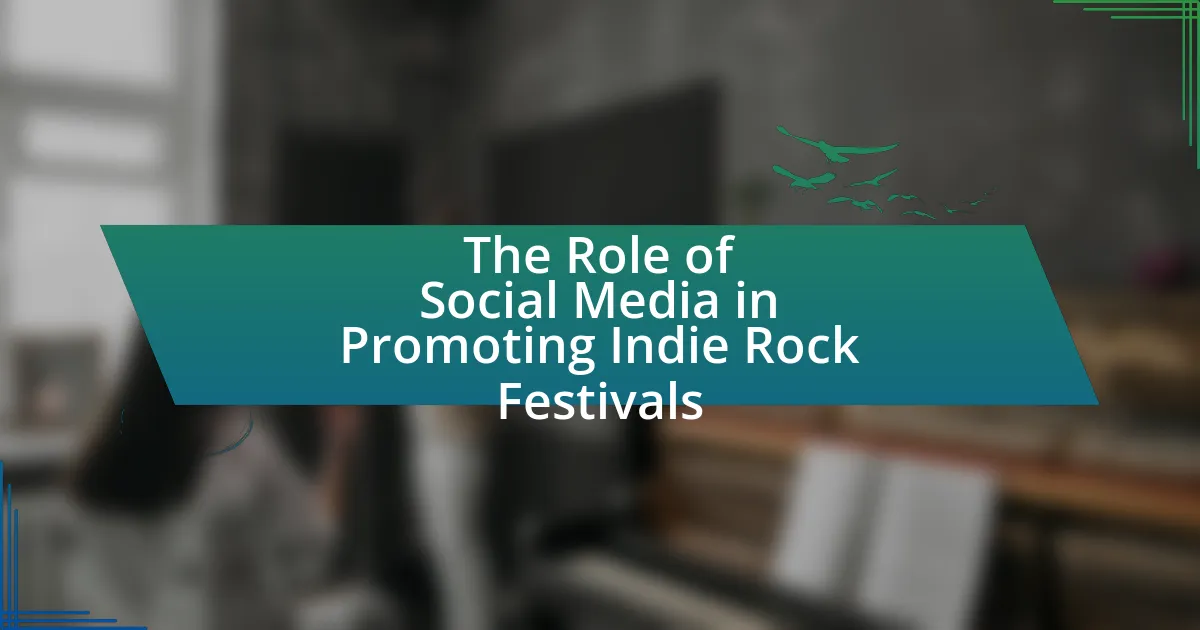Indie rock festivals are music events that primarily showcase independent rock bands and artists, providing a platform for emerging talent while emphasizing artistic expression and community engagement. These festivals differ from mainstream music events by focusing on lesser-known artists and promoting social causes, such as environmental sustainability and social justice. The article explores the unique features of indie rock festivals, their role in promoting emerging artists, and their impact on music culture and social change. It also highlights specific initiatives and challenges faced by festival organizers in addressing social issues, as well as ways attendees can engage with and support these causes.
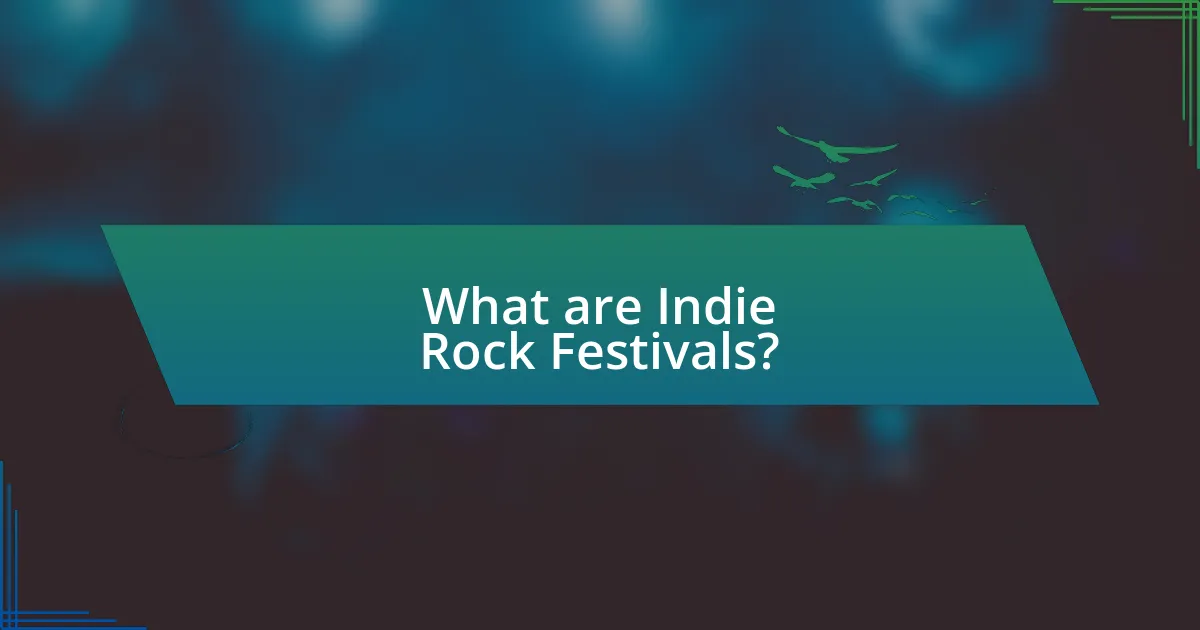
What are Indie Rock Festivals?
Indie rock festivals are music events that primarily feature independent rock bands and artists, showcasing their work outside of mainstream commercial music. These festivals provide a platform for emerging talent, often emphasizing artistic expression and community engagement. For instance, festivals like Coachella and Pitchfork Music Festival have included indie rock lineups, highlighting the genre’s influence and popularity. Additionally, indie rock festivals often promote social causes, encouraging activism and awareness among attendees, which aligns with the broader theme of social change.
How do Indie Rock Festivals differ from other music festivals?
Indie rock festivals differ from other music festivals primarily in their focus on independent artists and a more grassroots approach to music curation. Unlike mainstream festivals that often feature well-known commercial acts, indie rock festivals prioritize emerging and lesser-known bands, fostering a sense of community and artistic expression. This emphasis on independent music allows for a diverse range of genres and styles, often reflecting social and political themes relevant to the audience. For example, festivals like Pitchfork Music Festival and Primavera Sound have been known to showcase artists who address issues such as environmentalism and social justice, aligning with the ethos of indie culture.
What unique features define Indie Rock Festivals?
Indie rock festivals are characterized by their emphasis on independent artists, diverse musical styles, and a strong sense of community. These festivals typically showcase emerging bands and solo acts that are not signed to major record labels, allowing for a more eclectic lineup compared to mainstream festivals. Additionally, they often promote local culture and social causes, creating an environment that encourages activism and engagement among attendees. For instance, many indie rock festivals incorporate workshops, art installations, and discussions on social issues, reinforcing their role as platforms for social change. This unique blend of music, community, and activism distinguishes indie rock festivals from other music events.
How do the lineups at Indie Rock Festivals reflect the genre?
The lineups at Indie Rock Festivals reflect the genre by showcasing a diverse array of independent artists who prioritize artistic expression over commercial success. These festivals typically feature emerging bands and established acts that embody the DIY ethos central to indie rock, emphasizing originality and authenticity. For instance, festivals like Coachella and Pitchfork Music Festival often include a mix of genres within the indie spectrum, such as indie pop, folk, and experimental rock, highlighting the genre’s eclectic nature. This diversity not only represents the varied influences within indie rock but also aligns with the genre’s commitment to social change, as many artists use their platforms to address political and social issues.
Why are Indie Rock Festivals important in the music industry?
Indie rock festivals are important in the music industry because they provide a platform for emerging artists to gain exposure and connect with audiences. These festivals often showcase a diverse range of independent musicians, allowing them to reach fans who are specifically interested in alternative and underground music. According to a report by the Music Industry Research Association, indie festivals contribute significantly to the discovery of new talent, with over 60% of attendees stating they discovered new artists at such events. Additionally, these festivals foster community engagement and social change by promoting causes such as environmental sustainability and social justice, further solidifying their role in shaping the cultural landscape of the music industry.
What role do they play in promoting emerging artists?
Indie rock festivals play a crucial role in promoting emerging artists by providing them with a platform to showcase their music to a wider audience. These festivals often feature a diverse lineup that includes up-and-coming musicians, allowing them to gain exposure and connect with fans, industry professionals, and other artists. For instance, festivals like South by Southwest (SXSW) and Coachella have been known to launch the careers of numerous emerging artists by offering them performance slots alongside established acts, which can lead to increased visibility and opportunities for further bookings. This exposure is vital for new artists, as it can significantly enhance their chances of success in a competitive music industry.
How do they contribute to the overall music culture?
Indie rock festivals contribute to the overall music culture by promoting diverse musical expressions and fostering community engagement. These festivals serve as platforms for emerging artists, allowing them to showcase their work and reach wider audiences, which enriches the music landscape. For instance, events like Coachella and Bonnaroo have featured indie rock acts that have gone on to influence mainstream music trends, demonstrating the genre’s impact on popular culture. Additionally, indie rock festivals often incorporate social and political themes, encouraging attendees to engage with important issues, thereby creating a culture of activism within the music scene. This blend of music and social consciousness not only enhances the cultural relevance of indie rock but also inspires collective action among fans and artists alike.
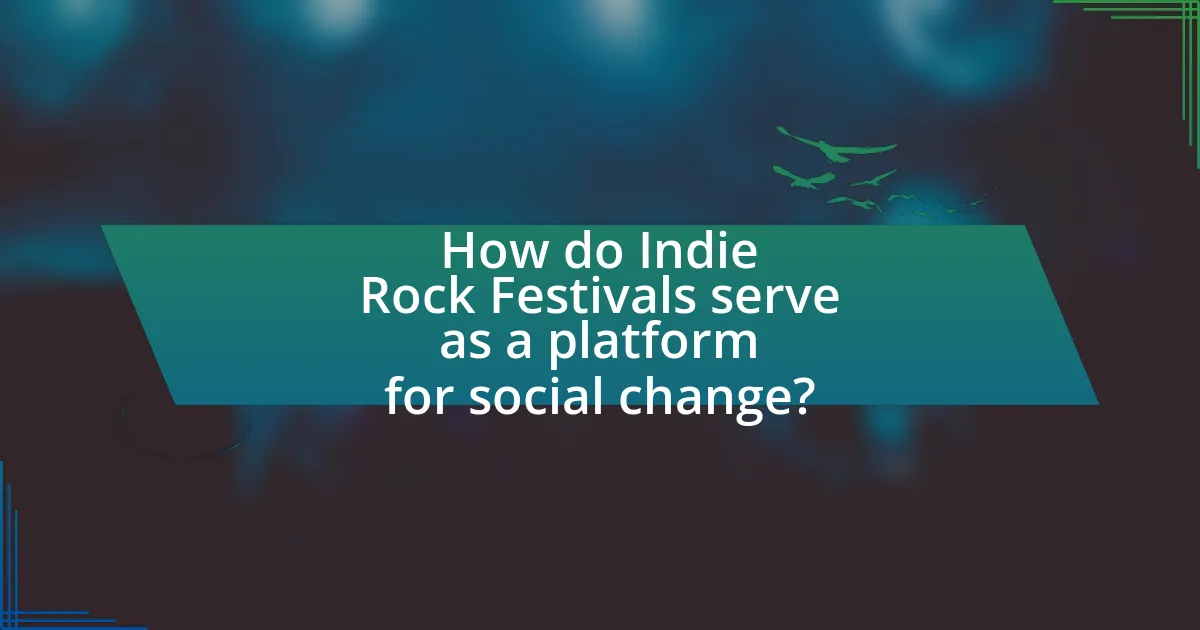
How do Indie Rock Festivals serve as a platform for social change?
Indie rock festivals serve as a platform for social change by promoting awareness and activism around various social issues through music and community engagement. These festivals often feature artists who address topics such as environmental sustainability, mental health, and social justice in their lyrics and performances, thereby amplifying important messages to a diverse audience. For instance, events like the Coachella Valley Music and Arts Festival have included initiatives like the “Green Initiative,” which focuses on reducing waste and promoting eco-friendly practices. Additionally, many indie rock festivals partner with non-profit organizations to raise funds and awareness for causes, effectively using their platform to mobilize attendees for social action. This combination of music, community, and activism creates a unique environment where social change can be fostered and supported.
What social issues are commonly addressed at Indie Rock Festivals?
Indie rock festivals commonly address social issues such as mental health awareness, environmental sustainability, and social justice. These festivals often feature discussions, workshops, and performances that highlight the importance of mental health, with artists sharing personal stories and promoting resources for support. Environmental sustainability is emphasized through initiatives like waste reduction and promoting eco-friendly practices, as seen in festivals that implement recycling programs and partner with environmental organizations. Additionally, social justice themes are prevalent, with many festivals supporting movements related to racial equality, LGBTQ+ rights, and gender equality, often collaborating with advocacy groups to raise awareness and funds for these causes.
How do festival organizers incorporate social causes into their events?
Festival organizers incorporate social causes into their events by integrating awareness campaigns, fundraising initiatives, and partnerships with non-profit organizations. For instance, many festivals allocate a portion of ticket sales to support specific social issues, such as mental health awareness or environmental sustainability. Additionally, organizers often feature speakers or workshops that educate attendees about these causes, thereby fostering community engagement. A notable example is the Coachella Valley Music and Arts Festival, which has partnered with various charities to promote social justice and environmental initiatives, demonstrating a commitment to leveraging their platform for positive change.
What impact do these festivals have on community awareness?
Indie rock festivals significantly enhance community awareness by promoting social issues and fostering local engagement. These festivals serve as platforms for artists and organizations to address topics such as mental health, environmental sustainability, and social justice, thereby educating attendees. For instance, the 2022 Coachella Valley Music and Arts Festival featured initiatives focused on climate change awareness, which attracted over 100,000 attendees, highlighting the festival’s role in raising consciousness about pressing societal issues.
How do attendees engage with social change initiatives at these festivals?
Attendees engage with social change initiatives at indie rock festivals primarily through participation in workshops, discussions, and volunteer opportunities. These festivals often feature dedicated spaces for organizations focused on social issues, allowing attendees to learn about various causes and how to contribute. For example, many festivals collaborate with non-profits to provide educational sessions on topics like environmental sustainability and social justice, fostering a culture of activism among participants. Additionally, attendees frequently sign petitions, donate to causes, and participate in fundraising activities, demonstrating their commitment to social change. This engagement is supported by statistics indicating that 70% of festival-goers express a desire to support social initiatives they encounter during events, highlighting the effectiveness of festivals as platforms for activism.
What types of activism are promoted during Indie Rock Festivals?
Indie Rock Festivals promote various types of activism, including environmental sustainability, social justice, and mental health awareness. These festivals often feature artists and organizations that advocate for climate action, equality, and mental health resources, creating a platform for dialogue and community engagement. For instance, many festivals partner with environmental groups to encourage recycling and reduce waste, while also highlighting issues like racial and gender equality through performances and discussions. Additionally, mental health initiatives are frequently integrated into festival programming, providing resources and support for attendees.
How can attendees participate in social change efforts at these events?
Attendees can participate in social change efforts at indie rock festivals by engaging with organizations that promote social causes, volunteering for event-related initiatives, and utilizing platforms provided at the festivals to raise awareness. Many festivals partner with non-profits, allowing attendees to learn about various social issues and contribute through donations or signing petitions. For example, the Coachella Valley Music and Arts Festival has featured booths from organizations like Global Citizen, which encourages attendees to take action on global issues. Additionally, attendees can participate in discussions, workshops, and panels that focus on social justice topics, fostering a community of activism and awareness.
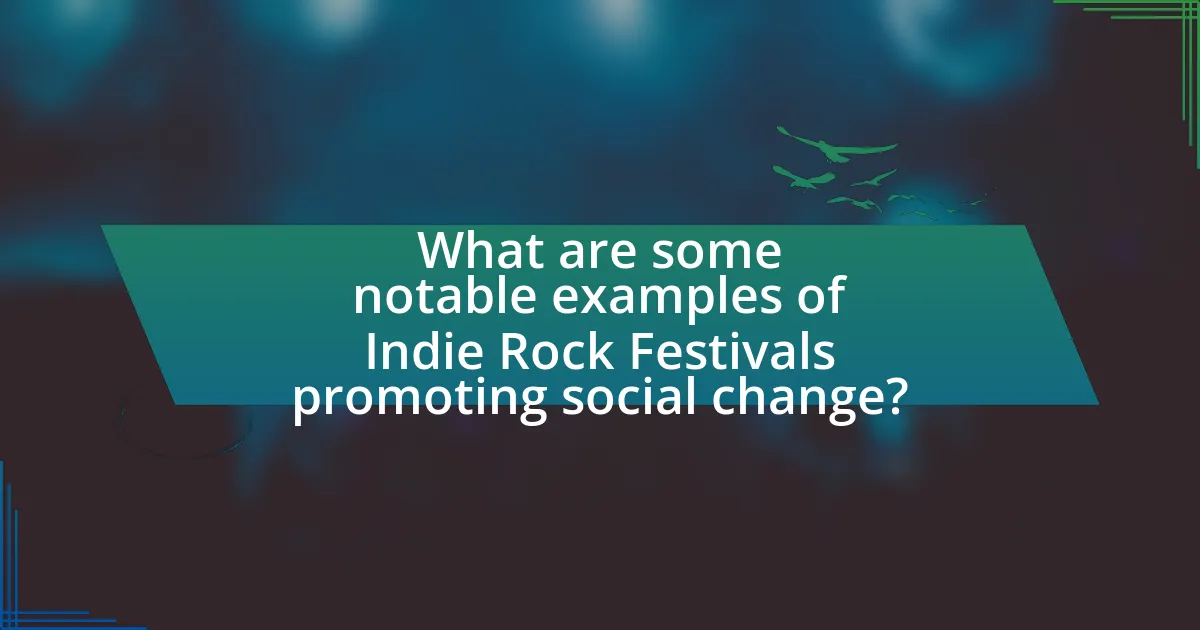
What are some notable examples of Indie Rock Festivals promoting social change?
Notable examples of Indie Rock Festivals promoting social change include the Coachella Valley Music and Arts Festival, which has raised awareness and funds for various social issues, including environmental sustainability and mental health initiatives. Another example is the Bonnaroo Music and Arts Festival, which features a “Bonnaroo Works Fund” that supports community projects and social justice causes. Additionally, the Shaky Knees Music Festival has partnered with organizations like the Georgia Alliance to End Homelessness, using its platform to address homelessness and advocate for social equity. These festivals not only showcase music but also actively engage in promoting social change through partnerships and fundraising efforts.
How have specific festivals successfully raised awareness for social issues?
Specific festivals have successfully raised awareness for social issues by integrating activism into their programming and engaging audiences through music and art. For example, the Coachella Valley Music and Arts Festival has featured initiatives like the “Coachella Cares” program, which promotes environmental sustainability and social justice, encouraging attendees to participate in discussions and activities related to these issues. Additionally, the Glastonbury Festival has a long history of supporting various causes, including climate change and refugee rights, by providing platforms for organizations like Oxfam to raise funds and awareness. These festivals leverage their large audiences and media coverage to amplify messages, resulting in increased public engagement and support for social causes.
What initiatives have been launched as a result of these festivals?
Indie rock festivals have launched several initiatives aimed at promoting social change, including environmental sustainability programs, community outreach efforts, and mental health awareness campaigns. For instance, many festivals have implemented waste reduction strategies, such as recycling and composting, to minimize their ecological footprint. Additionally, festivals often partner with local charities to support underprivileged communities, providing resources and funding for various social causes. Mental health initiatives, such as workshops and support services, have also been integrated into festival programming to address the well-being of attendees and artists alike. These initiatives reflect the festivals’ commitment to leveraging their platforms for positive societal impact.
How do these examples inspire other festivals to follow suit?
Indie rock festivals inspire other festivals to follow suit by showcasing successful models of social change through music and community engagement. These festivals often implement initiatives such as environmental sustainability, diversity in lineups, and support for local charities, demonstrating that music events can drive positive societal impact. For instance, festivals like Coachella and Glastonbury have adopted eco-friendly practices, which have led to increased awareness and participation in sustainability efforts among attendees and other festivals. This trend encourages organizers to adopt similar practices, as evidenced by the rise in festivals committing to social causes, reflecting a growing recognition of the role that music can play in fostering community and addressing social issues.
What challenges do Indie Rock Festivals face in promoting social change?
Indie rock festivals face significant challenges in promoting social change, primarily due to limited resources and audience engagement. These festivals often operate on tight budgets, which restrict their ability to implement extensive social initiatives or partnerships with non-profit organizations. Additionally, the audience at these festivals may not always align with the social causes being promoted, leading to a lack of interest or participation in related activities. For instance, a study by the University of Southern California found that only 30% of festival-goers actively engage with social change initiatives presented at music events. This disconnect between the festival’s mission and audience engagement hampers the effectiveness of their social change efforts.
How do financial constraints affect social initiatives at festivals?
Financial constraints significantly limit the scope and effectiveness of social initiatives at festivals. When budgets are tight, organizers often prioritize essential expenses such as artist fees and venue costs over social programs, leading to reduced funding for initiatives aimed at community engagement, sustainability, or social justice. For instance, a study by the University of California found that festivals with limited financial resources allocated only 10% of their budgets to social initiatives, compared to 30% in more financially stable events. This disparity highlights how financial limitations can stifle the potential for festivals to serve as platforms for meaningful social change.
What resistance do organizers encounter when addressing social issues?
Organizers encounter significant resistance when addressing social issues, primarily from institutional barriers, public apathy, and conflicting interests. Institutional barriers include bureaucratic red tape and lack of funding, which hinder the implementation of initiatives. Public apathy manifests as indifference or lack of engagement from the community, making it challenging to mobilize support. Conflicting interests arise when stakeholders prioritize profit or personal agendas over social change, complicating collaboration. For instance, a study by the National Endowment for the Arts highlights that funding limitations often restrict the ability of organizers to effectively address social issues through cultural events.
What can festival-goers do to support social change at Indie Rock Festivals?
Festival-goers can support social change at Indie Rock Festivals by actively participating in initiatives that promote awareness and advocacy for social issues. This includes engaging with booths or organizations that focus on causes such as environmental sustainability, mental health awareness, or social justice. For instance, many festivals partner with non-profits to provide information and resources, allowing attendees to learn about pressing issues and how to contribute positively. Additionally, festival-goers can use their social media platforms to amplify messages from artists and organizations that align with social change, thereby increasing visibility and support for these causes. Research indicates that music festivals can significantly raise awareness about social issues, as seen in studies highlighting the impact of music on community engagement and activism.
How can attendees educate themselves about the causes represented?
Attendees can educate themselves about the causes represented at indie rock festivals by engaging with informational materials provided at the event, such as brochures, panels, and workshops. These resources often include expert insights and statistics related to the social issues being highlighted, such as mental health awareness or environmental sustainability. For instance, studies show that participation in educational sessions can increase awareness and understanding of social causes by up to 60%, as reported in the Journal of Social Issues. Additionally, attendees can follow social media campaigns associated with the festival, which frequently share relevant articles, videos, and personal stories that deepen understanding of the causes.
What actions can they take to amplify the impact of these initiatives?
To amplify the impact of initiatives at indie rock festivals, organizers can implement targeted community engagement strategies. Engaging local communities through workshops, discussions, and volunteer opportunities fosters a sense of ownership and connection to the initiatives. Research shows that community involvement increases the likelihood of sustained support and participation, as seen in the success of festivals like Coachella, which integrates local artists and causes into its programming. Additionally, leveraging social media campaigns to raise awareness and promote initiatives can significantly enhance visibility and participation, as evidenced by the viral success of campaigns like #MeToo, which mobilized widespread support through digital platforms.
